
Court halts tailings increase as First Nation challenges B.C.’s decision to greenlight it
Court sides with Xatśūll First Nation, temporarily halting Mount Polley mine waste expansion
This story was originally published by Ricochet.
The mountain woodland shimmers green with hints of rust-coloured Fall descending to envelop it in silent foliage. The steady roar of a glacial river echoes nearby. Tiny families of grouse scurry through the underbrush while other wild birds fill the sky with their melodies. Bears leave red-berried scat piles dispersed on the forest floor, hints of their seasonal feasting.
But that isn’t all you can hear out here on the Morice River Forest Service Road southwest of Houston, B.C.
The chatter of natural life is interrupted by pulsating construction equipment and the constant hum of industrial traffic.
Near the 63-kilometre mark of the unpaved road, an unassuming trail is manned by round-the-clock security employed by the Coastal GasLink liquified natural gas pipeline company.
Na’moks, 64, an Indigenous hereditary leader, whose name was passed onto him through an ancient lineage of sovereign Wet’suwet’en laws, language and culture, arrives at the gate to check on his yintah (territory).
“Who do I speak to?” Na’moks, dressed in grey slacks and a denim jacket with an orange ribbon honouring Indian residential school victims on his lapel, asks a burly security guard.
A group of nine land defenders, several concealing their identities with toques and masks, wait quietly behind him.
“Hello sir, we’re with CGL security, how can I help you today?” responds the guard while two more guards film the interaction. The land defenders also document every move of these unwelcome “invaders” on unceded Wet’suwet’en territory.
“I’m going to go for a walk in and check on things,” explains Na’moks bluntly. He locks eyes with the guard and the eyeglasses resting on the top of his nose catch the glare of the sun.
“I’m going to stay on the main road, people are coming with me for my security and safety because I do not trust you or the RCMP.”
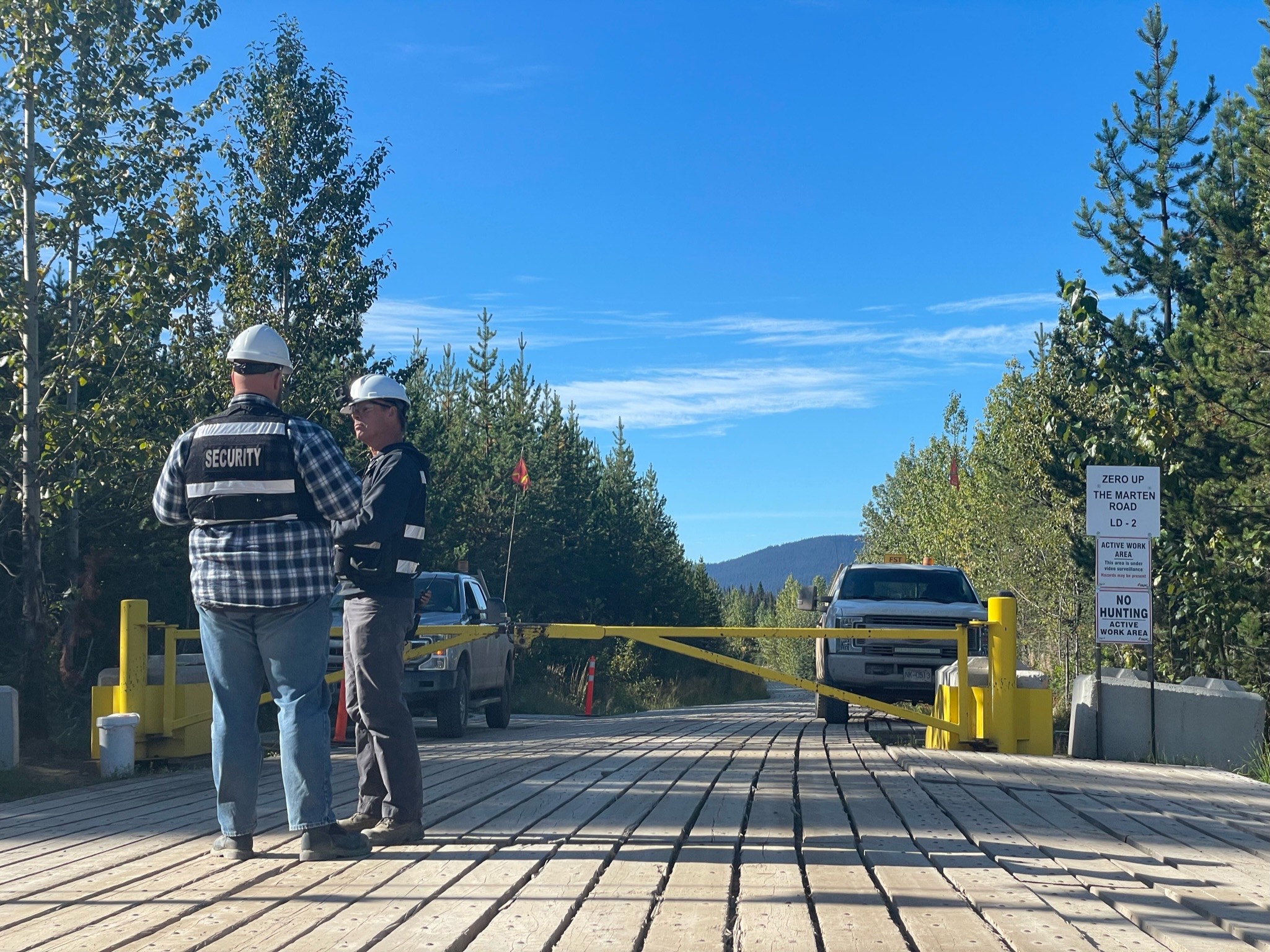
A thick tension permeates the air.
“We will not be impeding the work,” continues Na’moks. “We’re just going to go in and check on things and walk.”
The security guard answers sharply, “I just want to remind you that work being conducted here is lawfully authorized and permitted.”
Na’moks affirms his sovereign authority. “I am the hereditary chief and I have full jurisdiction over … ”
The guard continues, speaking over Na’moks, and looking away to face the land defenders, “the Supreme Court of B.C. injunction is in place with enforcement prohibiting anyone from interfering with, stopping or obstructing work activities.”
Na’moks again tells the guard he has the legal right to access the area and requests to see the Coastal GasLink drill pad site that will destroy this part of his homelands.
The guards and the pipeline company are trespassers on Wet’suwet’en traditional territory: an intact wilderness rich with plant medicines, meat to harvest and clean drinking water flowing in the Wedzin Kwa (blue-green river), a sacred Wet’suwet’en waterway that is under imminent threat as Coastal GasLink prepares to drill a route for its pipeline underneath the river.
In a statement provided to Ricochet and The Narwhal, Coastal GasLink says it “is in the process of completing trenchless watercourse crossings underneath the Morice River and Crocker Creek. To date, eight out of 10 major watercourse crossings have been safely completed. The tunnelling process under the Morice River is anticipated to last until the end of the year.”
Coastal GasLink states their method of drilling is safe. But Wet’suwet’en hereditary leaders disagree.
Wedzin Kwa is a key salmon migration route relied upon by the Wet’suwet’en. The pipeline also threatens the purity of the river’s drinking water.
This area is usually crawling with RCMP, who have a command post along the service road. Their mission is to ensure Coastal GasLink gets its pipeline built.
In late 2018, Coastal GasLink obtained an injunction against land defenders blocking the pipeline right-of-way that weaves through approximately 190 kilometres of Wet’suwet’en territory.
Since then, the RCMP have conducted three heavily armed raids, spending nearly $20 million to police the Morice River Forest Service Road, which runs alongside the Wedzin Kwa for part of its route.
Jocey Alec, daughter of Gidimt’en Clan Hereditary Chief Woos, left school to travel home to help protect her territories. It’s her first time coming back to this part of her territory since she was arrested at gunpoint on Nov. 19, 2021. “I felt scared for my life,” she says. She speaks passionately about her mission to save her yintah.
About 75 land defenders have been arrested since enforcement of the injunction began.
The most recent raid took place in November 2021, at the Coyote resistance camp (now cleared by Coastal GasLink and RCMP), on the site where Na’moks is now negotiating with the guard.
The Coyote camp blocked the roadway leading to the drill pad site.
“We woke up at five in the morning [that day] and a weasel came in and it got really close. And it started like waking each of us up. And so we took that as a sign that we had to get ready cause RCMP were coming. It happened like an hour later, we heard the machinery coming … ”
The RCMP used a canine unit, sniper rifles, helicopters and a chainsaw to gain access to a tiny house containing unarmed Wet’suwet’en and supporters. Over two days police arrested, charged and jailed over a dozen land defenders, as well as two journalists.
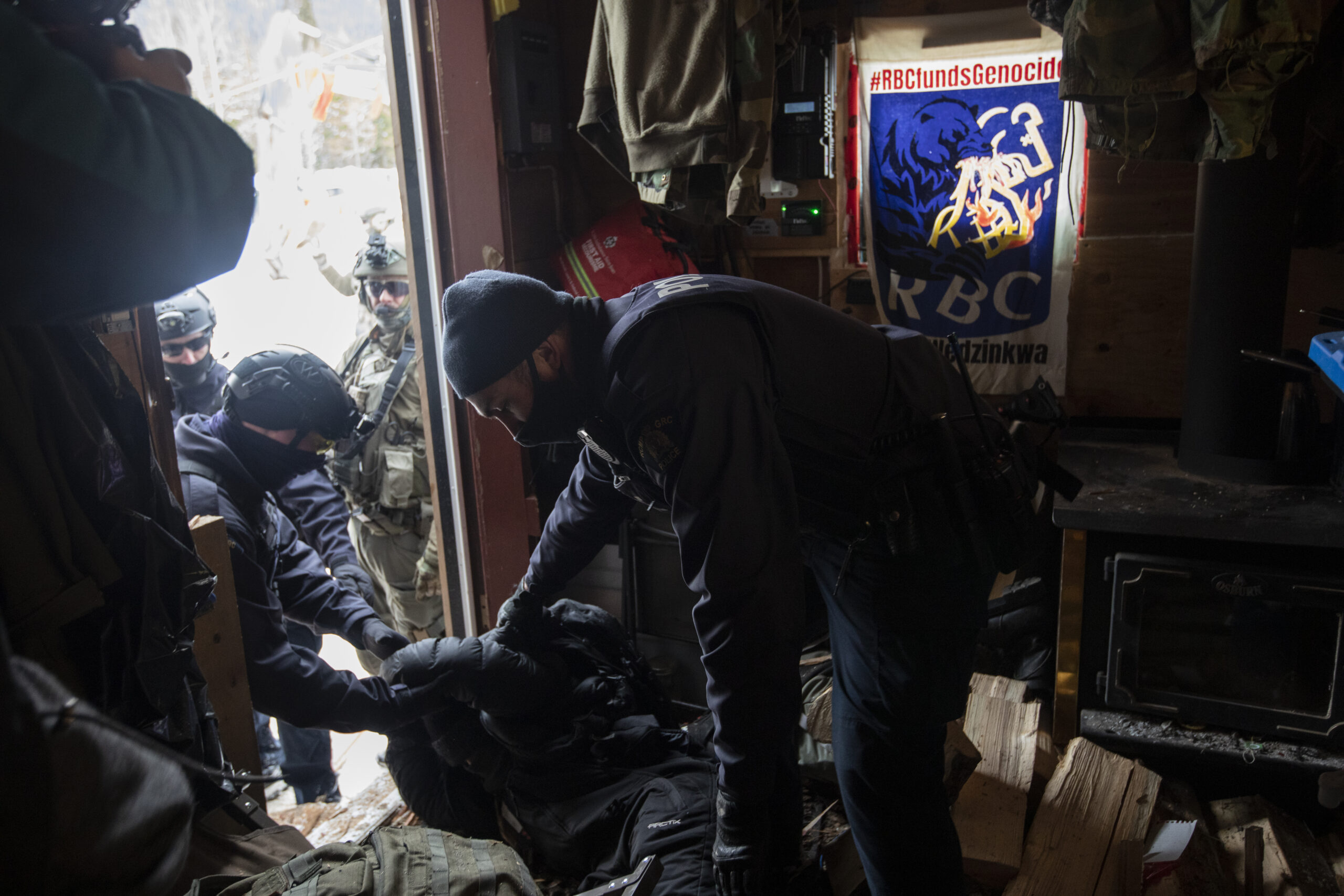
Three months later, on Feb. 17, Coastal GasLink security reported acts of violence at a worksite along the Morice River Forest Service Road. It said individuals engaged in a violent confrontation with Coastal GasLink employees and police officers.
The next day, RCMP deployed 40 officers to the area to investigate, canvassing camps and rural homes along the road. That was when the RCMP launched a harassment campaign lasting nearly five months according to land defenders living at a former Wet’suwet’en village site in Gidimt’en Clan territory, around the 44-kilometre mark of the service road.
Since the RCMP initially announced their investigation into the alleged attacks at the Coastal GasLink worksite, they have not released any additional information or identified any suspects.
(The RCMP told The Narwhal its increased presence was in response to the February incident and said the investigation remains ongoing. “The RCMP continues to have a presence in the Morice River Forest Service Road corridor conducting roving patrols. We have actually maintained a presence in the corridor since 2019, however, following the violent confrontation against employees of Coastal GasLink on the Marten Forest Service Road on February 17, 2022, the RCMP has been concerned for the safety of those in the area and has increased our presence patrolling around the industry camps and other camps along the route, and interacting with people in the area.”)
In response to the RCMP’s escalated surveillance, Wet’suwet’en Nation elders Janet Williams, Lawrence Bazil and Molly Wickham (a Gidimt’en Clan member known as Sleydo’ who has been at the forefront of the resistance against the pipeline project) filed a civil lawsuit against the RCMP in July. The suit claims that while the injunction allows Coastal GasLink to safeguard access through the service road, the order doesn’t allow police to stop Wet’suwet’en people from “using, occupying and residing on their land.”
The usually ever-present RCMP are absent from the drill site entrance today.
“We will walk to the side of the road … ” Na’moks assures the guard he isn’t there to make trouble.
The guard steps back to radio his supervisor and tells Na’moks to wait. A few minutes later he returns.
“I’ve been told that you’re allowed access, but your guests are not welcome to come today,” he motions to the waiting land defenders.
The back-and-forth negotiations last a few minutes longer before Na’moks decides to walk in accompanied by Jocey Alec, daughter of Gidimt’en Clan Hereditary Chief Woos, and two members of the media (this journalist and an independent filmmaker).
He ducks under a yellow metal gate and starts the almost three-kilometre hilly trek to the drill site. A security guard hurries to catch up.
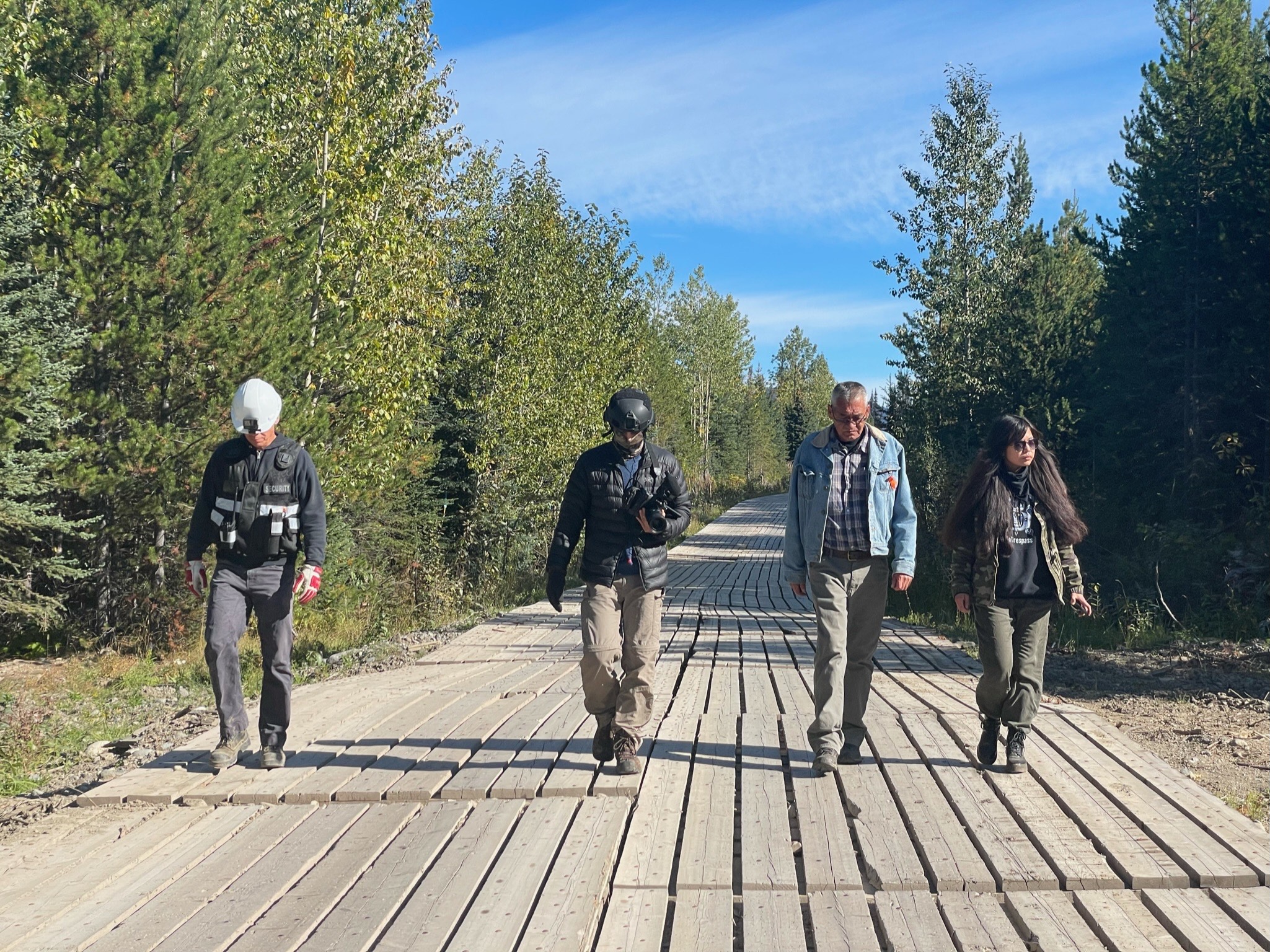
Na’moks mostly ignores the unwanted security escort and makes jokes to lighten the awkward mood. He says he enjoys the 20-minute walk on what is now a wooden planked roadway built by Coastal GasLink to transport equipment down towards the shores of Wedzin Kwa.
The sounds of boots marching in unison reverberate on the wood path as Na’moks shares stories of his grandmother taking him here as a child to pick berries. He points to patches once rich with huckleberries, raspberries and cranberries. Those patches, he points out, are now dwindling due to industrial activity.
Jocey, 28, dressed in a camo jacket adorned with colorful Indigenous resistance patches, listens intently, her thick, black hair flowing to her waist. She’s mostly silent. It’s her first time coming back to this part of her territory since she was arrested at gunpoint on Nov. 19, 2021.
She was living in a cabin built at the entrance to the worksite and meant to stop Coastal GasLink from drilling under Wedzin Kwa with her fiancé Teka’tsihasere Corey ‘Jayohcee’ Jocko, a Haudenosaunee land defender. Her father, Chief Woos, blessed the cabin in a ceremony before they moved in, she told Ricochet in an interview earlier that day.
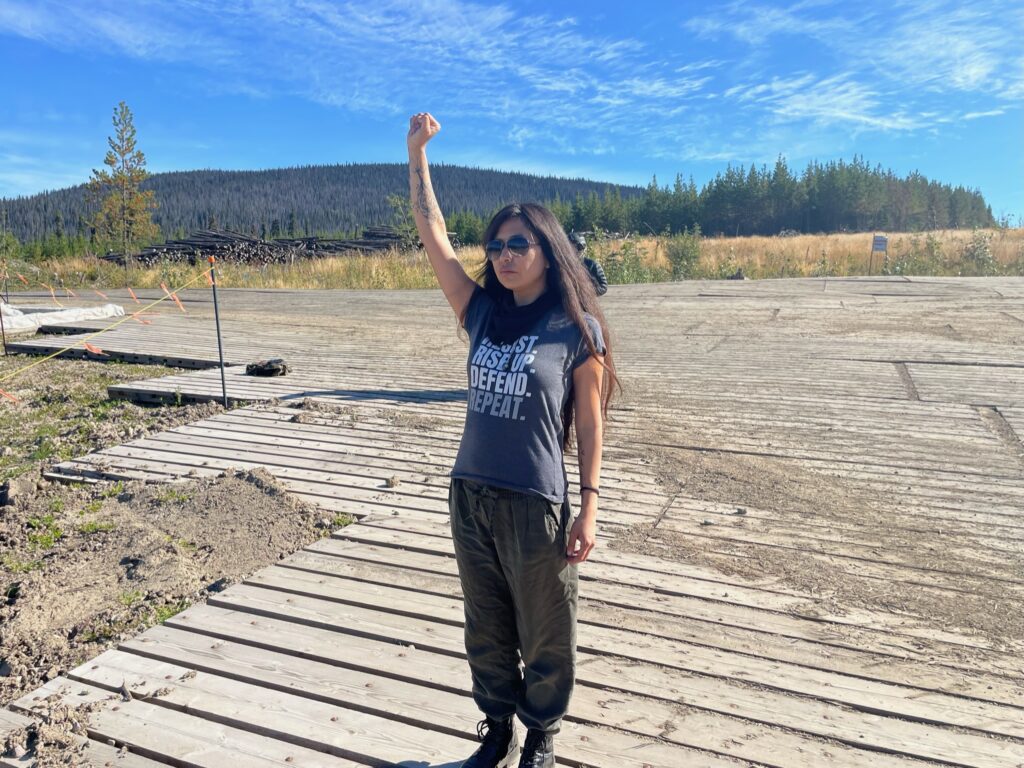
“A month after it got blessed, that’s when we got the call that militarized RCMP were on their way,” she says, gripping a hot mug of coffee to warm her petite stature as she shivered in the autumn morning chill.
She has vivid memories of the cabin door being broken down with an axe, as she dropped to her knees and screamed out that they were unarmed. At one point she counted four guns pointed at them.
“They had their snipers on us, and the canines were barking and growling. And they told us to come out of the cabin.”
Jocey was set to graduate with a diploma in social work when she says her life path shifted and led her home to protect her territories. She had never been in trouble with the law. “I felt scared for my life,” Jocey, who comes across as soft-spoken and shy, says. She speaks passionately about her mission to save her yintah.
“At the same time, I just stood there with pride because we did it for our land and the people and the animals. And I knew that our ancestors were there right beside us too.”
Jocey, along with the other land defenders, was arrested and taken to a prison cell hundreds of kilometres away in Prince George. She was held for four nights and five days, and charged with civil contempt for breaching the terms of the injunction. The charges were dropped this summer. Others still face criminal charges, including her fiancé and Sleydo’.
The industrial scars the pipeline project leaves on Wet’suwet’en territory are accompanied by physical, mental and spiritual scars seared onto the land defenders.
“After being released, my PTSD was through the roof,” the experience was so traumatic, Jocey says, that it caused her to vomit daily for a month following the raid.
“I still have triggers, like growling, barking dogs, helicopters, paddy wagons, RCMP, and … machinery.”
She left her territories for almost a year to recuperate with her fiancé in his Haudenosaunee territories at Akwesasne. She returned ready to continue the fight to protect Wedzin Kwa.
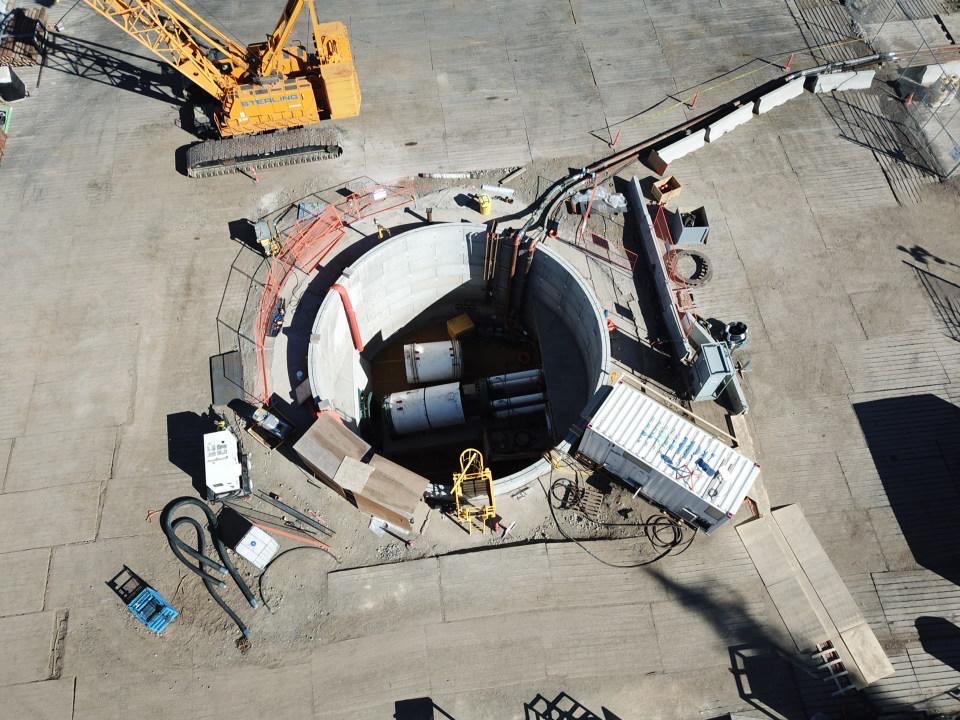
“I’ve been back since mid-August and right on my birthday, August 25 — because I brought my [release] conditions with me — I thought that was the perfect opportunity to burn them because, yeah, I’ll be staying here forever and they can’t tell me when I cannot be on my territory.”
But knowing the drill has arrived and is now assembled to carve through the earth under Wedzin Kwa is “gut-wrenching,” she says.
“I’m just trying not to cry about it right now … ”
Jocey and Na’moks reach a lookout where they can survey the massive worksite below. Gazing down you can see the cement-lined gap in the earth leading to a tunnel that will manoeuvre the drill under Wedzin Kwa, about half a kilometre away.
A helicopter thunders above and heads past the site across Wedzin Kwa where a long trench filled with steel pipes will snake to the North coast of the Pacific Ocean more than 300 kilometres away.
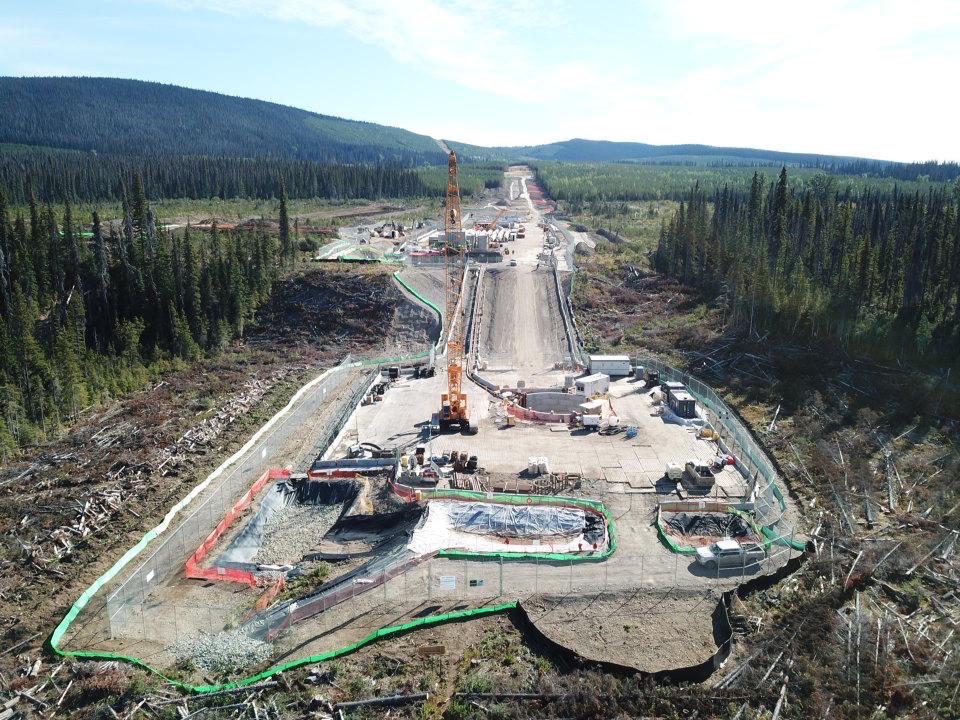
Na’moks places his arm around Jocey’s shoulders to comfort her as she fixes her gaze on the construction site, hiding her tears behind wide sunglasses.
She grasps tobacco in her hand and kneels to pray. When she releases the offering the wind gently carries it away.
“It’s really gut-wrenching,” she nods below and says she’s unable to speak because of the pain pulsating through her spirit.
Na’moks — who has been battling various industries eager to access his territories for over a decade, including the now several-year stand-off with Coastal GasLink — is furious at the sight of the drill pad below.
“We as the chiefs have never, ever allowed this. Although British Columbia illegally is issuing permits, it does not mean that we agree with it, and we never will agree with it. We follow our governance system. We know it’s impossible to have it [the pipeline] and then guarantee that anything back there will stand,” he says.
He points to the colourless line of cleared earth from the pipeline right-of-way beyond Wedzin Kwa and further into the coastal mountains.
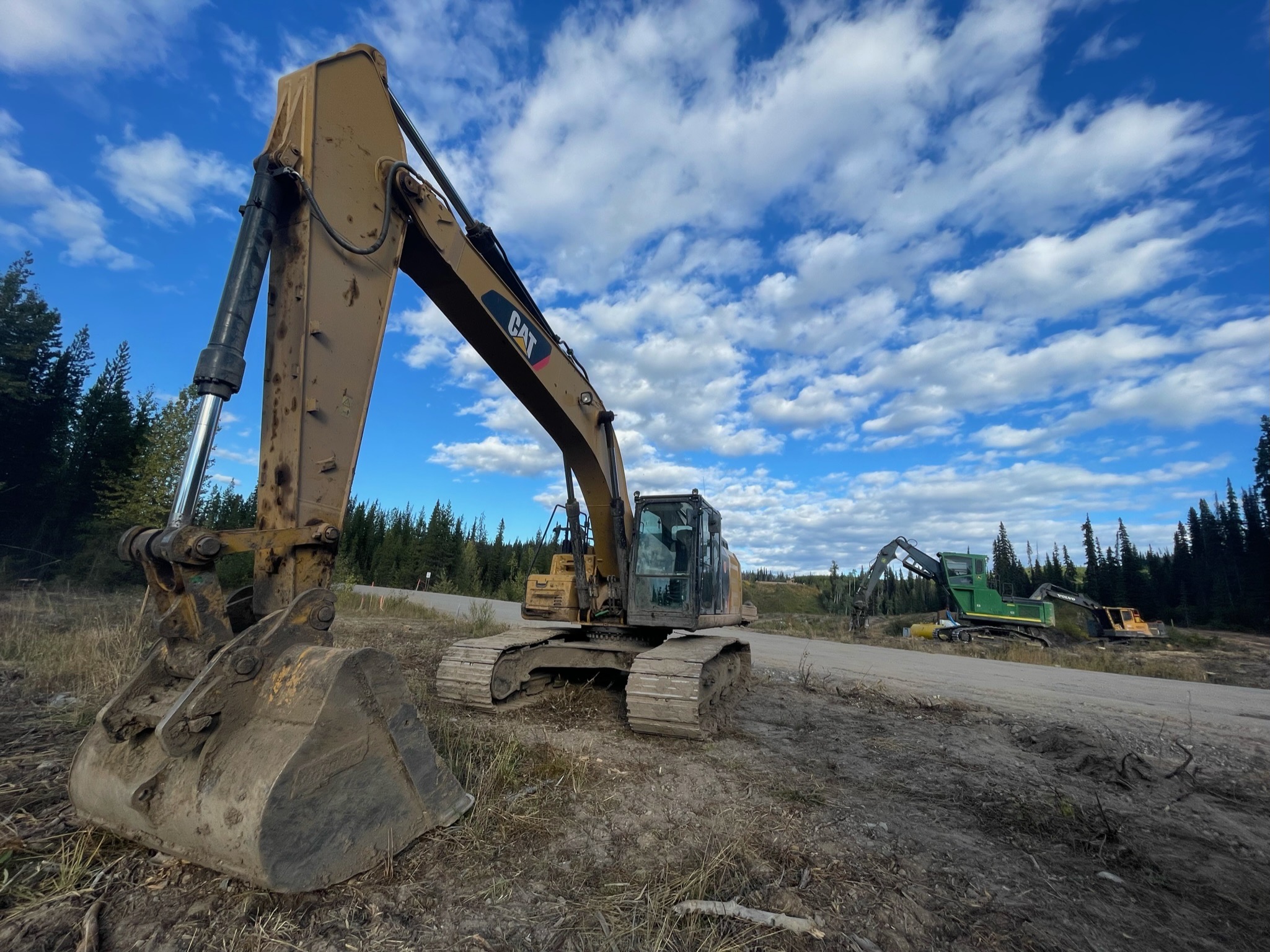
“This part of the mountain range is the gentle part. It gets more rugged and steep the farther you go back. Our people only went in there for a very short period of time in the wintertime for trapping, because of the terrain that is in there. We get earthquakes back there. It’s an avalanche zone. When earthquakes happen, tremors happen, and everything changes. There’s never been a pipeline built on this planet that has faced that type of terrain,” Na’moks says.
“They try to kill our water, our land, our rights and title. And for what? They should’ve just left it alone … it’s going to be an abandoned project. I am sure of it.”
Fewer stories are shared on the walk back from the site. The mood is sombre.
Jocey is embraced by her comrades upon her return.
“If they [Canada] really wanted truth and reconciliation, they would not force this colonial violence on us and just let us live and let us be on our own territory,” she says.
The grief hits hard and she takes in long, deep breaths of reflection.
Later that day Na’moks and Jocey join other Wet’suwet’en land defenders and a handful of supporters on a visit to the headwaters of Wedzin Kwa at Wedzin Bin (Morice Lake). It’s where Wet’suwet’en elders travel to recount stories of old, to pray, to hunt and fish. Wedzin Kwa is fed by the glaciers of the surrounding coastal mountains, before running more than 80 kilometres to Houston.
From there the river runs 148 kilometres west through several Indigenous and non-Indigenous communities before joining the mighty Skeena River system that eventually meets the Pacific Ocean south of Prince Rupert.
Sleydo’ brings her three children, Liam, 11, Lily, 6, and Winïh, 2, for a swim. It’s a break from the constant work to stop the pipeline, explains Sleydo’, who lives with her family on her territory in a nearby cabin.
“It kind of just sunk in today,” she says, referring to the Coastal GasLink drill as she cuddles Winïh in her lap.
“I think it’s been such a big thing in my life for so long. And we’ve spent years trying to prevent the drilling from happening. And we’ve just been working like every day, all day, trying to protect Wedzin Kwa. So, the fact that [the drill] is there now is…I feel really sad, but I feel really angry.”
During the November 2021 raids, Sleydo’ was arrested at gunpoint at Coyote camp, where she was perched on the edge of the pipeline’s path. She’s led opposition to the pipeline under the direction of hereditary chiefs. Sleydo’ and over a dozen other land and water defenders were strategically spread out across the territory, protecting the river. Troops of RCMP officers dressed in army fatigues, wielding AK-47 rifles and supported by snipers and attack dogs, ultimately used an axe to smash their way into a tiny house where she was barricaded.
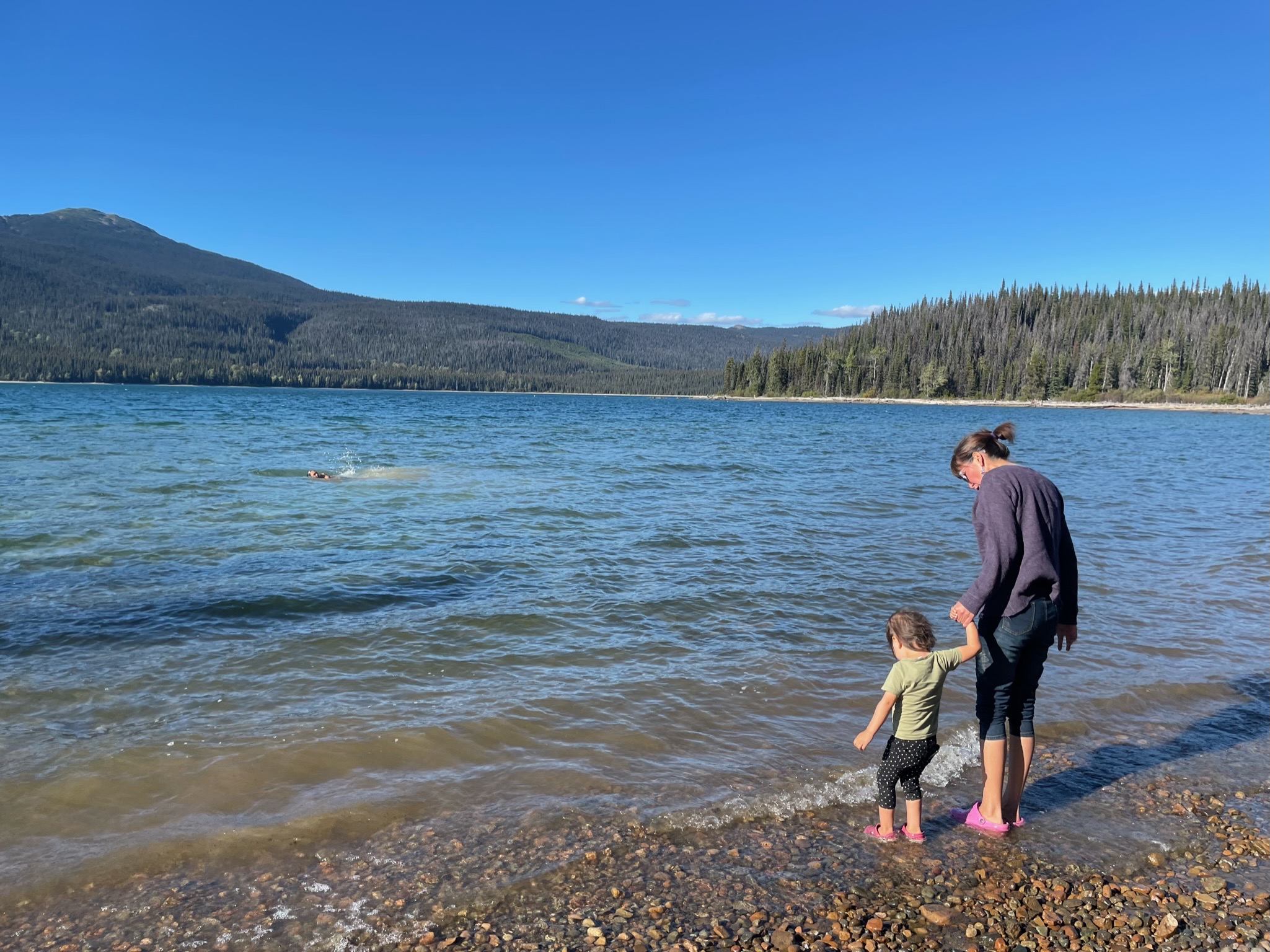
After spending nearly a week in jail, hundreds of kilometres from home, Sleydo’ was released and barred from entering the area where the Coyote camp had been. On July 7, Crown prosecutors decided to pursue a criminal contempt charge against her and four other land defenders for blockading the construction of the pipeline.
“Everything that we’ve done, everything that we’ve sacrificed, you know, I just wonder what else could we have done, what else could we do? And yet here we are, you know, the day that we never, ever wanted to see (when the drill is here),” her voice trails off, and she pauses to watch her son swimming in the lake.
She says she takes inspiration from her children and their right to drink clean water, breathe clean air and play freely in their ancestral lands.
“You know, this is not necessarily just for them, but for all of the babies that are going to want to swim in these headwaters and drink the water.”
Then she points out she’s not about to give up anytime soon.
“I don’t feel defeated in any way, shape or form, but there’s definitely a lot of emotions happening right now … we just have to dust ourselves off and keep going. Cause it’s not over by any stretch of the imagination. And so that’s what we’re going to do and we’re gonna do it fucking mad as hell because that’s what we are right now, is mad as hell.” She apologizes for swearing and then explains that she strives to harness her anger to fight on.
“I always try to do everything with love. Knowing that anger often comes from a place of love for the land and for our people. And that anger can kind of cloud our thinking, but it’s also a really good motivator.”
Get the inside scoop on The Narwhal’s environment and climate reporting by signing up for our free newsletter. On a warm September evening nearly 15...
Continue reading
Court sides with Xatśūll First Nation, temporarily halting Mount Polley mine waste expansion

Break out the champagne: Emma’s storied life and leadership in journalism has earned her the...

How can we limit damage from disasters like the 2024 Toronto floods? In this explainer...
